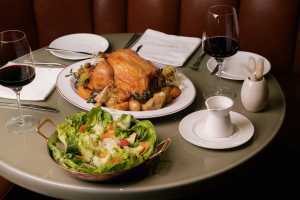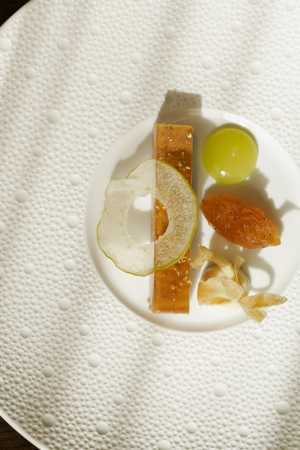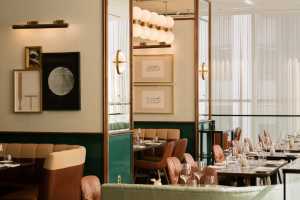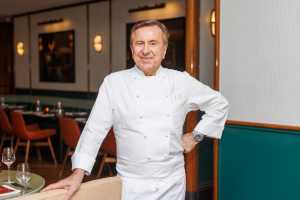In the culinary world, you know you’ve arrived when your restaurant bears your name — or better yet, just your first. Daniel Boulud, the French chef and restaurateur behind New York’s eponymous Daniel and Yorkville’s Café Boulud at the Four Seasons, is a four-Michelin-star heavyweight who hardly needs an introduction.
With a career spanning more than four decades, Boulud has built an empire of acclaimed restaurants across the globe, but Café Boulud in Yorkville remains one of his most personal outposts. Recently recognized among Toronto’s Michelin-starred restaurants, it brings the spirit of his Lyonnaise upbringing to Toronto, marrying French technique with seasonal Canadian ingredients. Open since 2015, it's managed to stay relevant in a city full of buzzy new openings.
I caught up with Boulud on a recent Toronto stop to find out what shaped him as a chef, his thoughts on the future of dining and that cameo in season three of The Bear.
What first inspired you to become a chef?
"I grew up around food from a very young age, helping my parents at the farm — growing vegetables, raising chicken, duck, guinea hens, squab and rabbits. We had a big garden, and it was a full farm. We were making cheese. We had about 40 goats and 20 cows.
"Every day, at the table, it was our food. Occasionally, we would buy a steak … but we had a butcher who would come to break down a calf, so that we could eat our own. I was always interested in ingredients, by the season. In France, we had the four seasons in perfect swing. Winter was really winter … what you do in the summer has nothing to do with what you do in the fall. In the fall, you go and pick the hazelnuts and the walnuts, and you have these pumpkins which grow everywhere in the field.

"My father was doing the farmer’s market in Lyon, and every Saturday we would fill up a truck with everything from the farm and have our stands and our regular customers. I really understood from that the pleasure you can give just with food. By having great food, people are loyal. They come back … So I didn’t know I was going to be a cook, but I took a lot of pride making sure that I was doing the right thing for my father and his customers."
How did that rustic style of cooking influence you?
"[At home] we never had truffle, foie gras and caviar, but it was rustic and delicious — really humble, but generous. And you could really tell when you were invited to eat somebody else’s cooking how bad they were! One thing was for sure: We knew how to cook. My grandmother was a very good cook, and my parents were helping each other to cook as well.
"When my father retired, he helped my mother — he decided to become a baker. We built a little wood oven, and he would crack his wood, and he would only do bread once a week. The bread he was making, he would keep it for a week … it was not a crusty baguette, it was the real sourdough loaf.
"He was like MacGyver — he didn’t have a mixing bowl for the bread, but he had a motor, and he made a tool with a hook. He put a plastic bucket over a spinning thing to hold it, and the dough itself would make the machine turn naturally … like knitting the dough."
"My father wanted to learn how to make smoked salmon [after I brought some back from the restaurant I worked at in Copenhagen]. He learned, and after that, for decades, until he was 94, he was making smoked salmon for the entire family. Food was always the biggest subject at home."
View on Instagram
When did you know you wanted to be a chef?
"Being raised on the farm, I didn’t want to be a farmer. My father may have been hoping I was going to take over the farm as the oldest boy … but it was not my thing. I liked the urban environment. I always liked to hang out in the kitchen with my grandmother to cook, rather than being in the field driving the tractor.
"My parents tried to put me in a cooking college, but it was so bad, and the teachers were such bad cooks — I didn’t understand what I was gonna do there. I hated it, and I told my parents I wasn't going there. I was 14 and I wanted to quit school.
"We had a neighbour, a very wealthy lady, Contessa di Volpi. She drove a Mustang with a little poodle on the side, while smoking a cigarette. She was gambling at the casino, she had horses at the race track — the quintessential money waster. She knew me since the age of eight, because by bicycle I delivered eggs, cheese, vegetables and chickens to her home.
"When my parents told her, 'We don’t know what to do with Daniel,' she said, 'I’m gonna take care of it.' She ate in all the best restaurants, so she went around to [Paul] Bocuse, to [Alain] Chapel, to all the different three-star and two-star Michelin chefs, and she found me a job at one of the best two-star restaurants in Lyon at the time. So in June I started … as a cook. No vacation, but I never complained, and I never looked back."
View on Instagram
French cuisine is the foundation of your cooking. How do you balance tradition with innovation?
"I have a lot of respect for tradition when it’s absolutely done with perfection. With traditional French cooking, there are different components. All those cuisines have hundreds of years of history — and it’s always reinvented.
"I have a lot of old cookbooks, French books … some from the 1800s, Carême, Escoffier — all very inspiring. They were very creative, but then cuisine got re-codified, and every chef today has a sense of creativity within a codified cuisine. Still, the essence of French cuisine is based on tradition.

"I remember as a young chef working for Michel Guérard and Roger Vergé … Those chefs were travelling the world, and every time they would come back from travel, they would bring ideas. Guérard went to China … we were testing a guinea hen stuffed with vegetables flavoured with soya sauce … wrapped in leaves and clay and baked.
"So, integrating foreign flavours, foreign ingredients, foreign seasoning into a recipe that has been forever in French cooking … that spirit continues. At Café Boulud in New York, the menu has four parts: La Tradition (French classics), La Saison (seasonal dishes), Le Potager (vegetarian), and Le Voyage (international inspiration). Right now in New York, we do Turkish cuisine because we have a young chef from Turkey. We explore the recipes together."
View on Instagram
Travel seems to play an important role for chefs. How does it inspire you?
"The story of my life is that I always wanted to travel. As a young chef, people told me, 'You chose an amazing profession, and you can do it anywhere in the world … people will eat.' And it’s true. I’m always inspired by where I am … I have restaurants in Singapore, South America … The cultural blend of our chefs is important, too. Our teams come from all over the world, so we always try to pick ideas from them."
How has the mental health and work culture in kitchens changed, and what steps have you taken to create a more positive and inclusive environment for your teams?
"I think if a chef is too hard on his staff, it may be because the chef is not a good teacher. If you really mentor someone well, you can't take for granted that they understand everything — you have to go back and [show them] again and again.
"With this learning curve, you have to be nice to people. If service is chaotic, and the cooks are creating the real chaos, it's not easy. [It's like] when they play basketball or soccer, and someone is messing up the team. That won't go well in the locker room!"
"We also have a huge amount of women working with us, which is very calming."
Who are some of the chefs you're proud to have mentored?
"In New York, there is a Canadian chef called Riad Nasr [owner of Frenchette]. I didn't mentor him, but Thomas Haas was my pastry chef at Daniel. It was the first time I brought on a non-French pastry chef (Haas is German). He's in Vancouver now [Thomas Haas Chocolates]. And from Toronto, Patrick Kriss at Alo and Carl Heinrich [Richmond Station]."
What are your thoughts on the future of fine dining?
"Fine dining has [become a lot more] casual, which is fine. In the old days, people dressed for fine dining — now they come in t-shirts and flip-flops. In New York, you can still demand a little bit of decency.
"The other day, I was at a fried chicken place and they served it with caviar and foie gras. So is that fine dining, or just a fried chicken place? Because it's going to cost you $300 to eat there with your champagne. Today, fine dining is not the most expensive. You can go to a bar and have a cocktail for $50. They serve truffle and caviar everywhere."
"My favourite word is fine-casual, because I like the casual approach to fine dining. That means that we can have the most humble dish that's delicious and seasonal, just as you can have the most expensive white asparagus right now. It's combining the two between fine dining and casual setting... fine dining in a casual setting."
What was it like making a cameo appearance in The Bear?
"I didn't know what to expect. I briefly zapped the show to try to understand what it was about and get familiar with The Bear. I knew some people involved in it, Matty [Mattheson], etc., but I hadn't watched it. I've done a lot of TV shows ... but this one was the most surreal, because the camera was there in the kitchen. There was very little [setup]. Basically, Jeremy Allen White [who plays Carmen in The Bear] had to walk into the restaurant, go to the kitchen and set himself up.
View on Instagram
"They said, 'Just cook with Jeremy. Do what you want to do, cook what you feel like. I didn't know if we would do three or four takes. But it was just one take. First, because Jeremy was so confident, and he does things right. And also, they just wanted it to feel real, so they took it the way it was. It went fast — it took a whole day to produce three minutes!"
"We made the paupiettes [of sea bass] together. That's where I'm telling him to listen to the 'music'. You want the butter to make noise — if you start to make smoke, or it doesn't make a noise, then it's not the right temperature. Cooking is about smelling, watching and hearing."
How does the Toronto food culture influence the menu at Café Boulud?
“The menu is different, but we're very ingredient-driven. We have to have the right ingredients to make the right recipes ... We [share] techniques between [the restaurants]. We borrow techniques from sauce, cooking and from creativity.

"I remember dining at the Black Hoof. It was very cool. That's what I like, in Toronto — there's a cross identity, but it has a meaning. It has a meaningful journey, sometimes in the story of the dish. I think that's why we see so many cuisines well represented: Asian, South American, European and Indian.
Have you eaten anywhere good in Toronto?
"Last time, we went to Matty's Mattheson's place, Prime Seafood Palace. I was surprised because you don't know what to expect from Matty. And then Adrak — very nice. The owner [Ambica Jain] is wonderful."
What's your guilty pleasure food?
"Gummy bears. And licorice from Denmark, they have so much licorice ... Otherwise, my guilty pleasure is caviar. I like caviar on scrambled eggs. Every New Year's Eve, I start with a dozen eggs, a can of caviar and a bottle of champagne.
"I have my own line of smoked salmon that I have been doing since my days in Copenhagen, which we do as a Danish-style smoked salmon. [I put that] on the scrambled eggs with a little bit of chive and lemon zest, on top of perfect, beautifully toasted brioche — and that's good."

